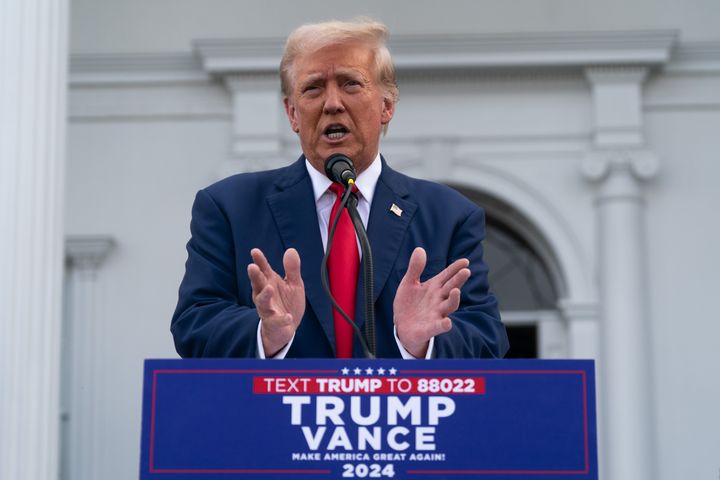Donald Trump has taken to promising that he will lower gasoline and energy prices by more than half in his first year back in office ― a pledge that, if carried out, would result in the destruction of the U.S. oil industry followed by a deep recession, experts said.
“Energy costs, all of it, air conditioning, heating, all of it, including gasoline, will drop by more than 50% within the first 12 months,” Trump promised again on Monday in Pennsylvania in what his campaign billed as an economic policy speech. “Your bill will be less than half.”
The problem, industry experts explained, is that energy is bought and sold in a global market, and the only way that gasoline could go from $3.40 a gallon now down to $1.70 a gallon is for crude oil prices to fall from $75 a barrel to between $20 and $30 a barrel. And at those lower prices, U.S. oil producers would not be able to break even.
“That would bankrupt the U.S. industry. And the entire U.S. industry would shut down before that happened,” said one oil executive with decades of experience who spoke on condition of anonymity to avoid antagonizing Trump and his campaign. “It’s classic Trump. He speaks hyperbolically without making any common sense.”
The coup-attempting former president, now also a convicted felon, has not provided any details about how he would lower gas prices so dramatically, other than his “Drill, baby, drill” mantra, which he offers as virtually the sole mechanism for his entire economic policy.
His campaign did not respond to HuffPost queries about whether Trump consulted with any actual oil industry leaders before issuing his cheap-energy promise.
Energy industry insiders said they doubt that he did because people with expertise would have told him that what he is suggesting is absurd.
“This kind of thing came out of the political shop,” the oil executive said.

Though Trump frequently brags that gasoline was less than $2 per gallon during his presidency, he fails to mention that the national average price of regular gas was only below that mark for two months during the depths of the COVID pandemic, when much of the economy had shut down and demand for gas had plummeted.
“We hit that price as a consequence of circumstances that most people would not want to repeat,” said industry analyst Kevin Book.
The average price for the rest of his term ranged from $2.08 to $2.90 ― substantially higher than the last two years of Democrat Barack Obama’s presidency. The average price per gallon when Trump left office, two weeks after his failed coup attempt, was $2.34.
Matt Randolph, another oil industry executive with more than three decades of experience in the business, frequently posts videos on social media lampooning politicians ― both Democrat and Republican ― for their claims about energy.
In a video he posted last week following a previous instance of Trump’s half-price promise, Randolph laughed at Trump’s pledge, laying out a scenario of oil industry layoffs triggering a recession. “This may be one of the dumbest statements that Donald Trump has ever made,” he said in closing.
In an interview with HuffPost, Randolph said that the only way to achieve a price of $1.70 a gallon for regular would be for crude oil prices to come down to $20 a barrel. And that, in turn, would collapse the domestic industry.
“Twenty dollar-a-barrel oil would just decimate new production,” he said, adding that the shutdown of oil production would also crater the production of natural gas, which is often extracted along with oil. “Natural gas prices would actually skyrocket.”
And, with so many power plants now burning methane, that would translate into much more expensive electricity, undermining a second element of Trump’s promise.
With no market mechanism to slash prices that sharply, Trump would be left with government action. “The only other way is massive subsidies to the American consumer,” Randolph said. “And that isn’t going to fly.”
Book, the oil analyst, agreed that he cannot think of a possible scenario, short of a global economic calamity, that would lead to $1.70-a-gallon gasoline. “This is one of those take it seriously not literally policy proposals.”
Disclaimer: The copyright of this article belongs to the original author. Reposting this article is solely for the purpose of information dissemination and does not constitute any investment advice. If there is any infringement, please contact us immediately. We will make corrections or deletions as necessary. Thank you.
